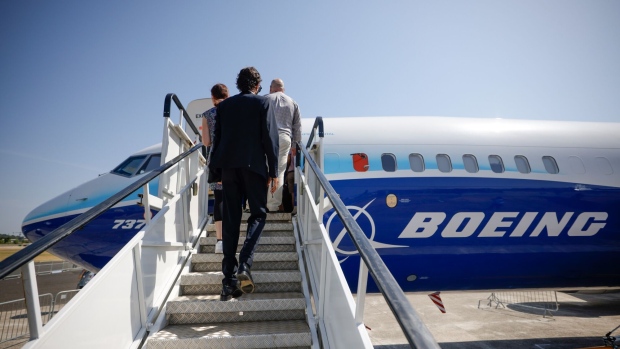Feb 21, 2024
Boeing’s Head of 737 Max Program to Depart After Midair Blowout
, Bloomberg News

(Bloomberg) -- Boeing Co. ousted the head of its 737 Max program, shaking up management less than two months after the midair blowout that’s led to withering scrutiny of manufacturing quality at the US planemaker.
Ed Clark, who helped ramp up 737 production in the aftermath of the Covid-19 pandemic, is stepping down immediately after nearly 18 years at Boeing, the company said Wednesday. Katie Ringgold succeeds him as vice president and general manager of the 737 program and Boeing’s factory in Renton, Washington.
Boeing also promoted production chief Elizabeth Lund to a new post as senior vice president of quality at Boeing Commercial Airplanes. She will also serve on the executive committee as chair of the planemaker’s quality operations council.
The management changes are the first undertaken since the company was plunged into crisis after a door plug exploded off a nearly new 737 Max on Jan. 5. US regulators have sent teams of inspectors to Boeing’s factories to review its quality controls and those of the supplier that makes most of the 737 Max’s fuselage.
In an unprecedented move, the Federal Aviation Administration has barred Boeing from increasing production rates for the cash-cow jet — its most important product — until the regulator is convinced the planemaker has an adequate grasp over the quality of work in its factories.
Read More: Boeing CEO Fights Back Tears in Address, Admits to ‘Mistake’
Clark’s exit is part of a broader shakeup announced by commercial chief Stan Deal in an internal memo Wednesday. Deal and Boeing Chief Executive Officer Dave Calhoun face pressure from regulators, lawmakers, airlines and investors to address a spate of high-profile manufacturing defects that have disrupted production since the Covid pandemic waned.
Investigators have said the panel on the Alaska Airlines plane should have been secured by four retaining bolts, but those critical parts were missing from the aircraft when it left Boeing’s Renton factory.
Boeing’s airplane division is working to ensure “that every airplane we deliver meets or exceeds all quality and safety requirements,” Deal said in the memo. “Our customers demand, and deserve, nothing less.”
Lund, a long-time engineering and operations leader, had previously overseen production of all Boeing commercial aircraft. Mike Fleming succeeds her as senior vice president and general manager of airplane programs. He will work closely with Lund to implement quality initiatives and minimize work that has to be redone or performed out of sequence due to late-arriving parts.
Since the blowout, the planemaker and airframe supplier Spirit AeroSystems Holdings Inc. have increased quality checks on the 737, and sought to retool their collaboration to reduce errors.
More changes are in store as FAA readies initial recommendations from an audit of Boeing’s practices that could come as soon as late this month. The agency is also near completion of a report on Boeing’s safety culture that was launched early last year, an outgrowth of the two deadly crashes that led to a global grounding of the 737 Max in 2019.
The agency’s findings are expected to inform recommendations for reforms by the company. The regulator also launched an investigation into Boeing after the Alaska accident, and has embedded more staff into Boeing’s factories as part of an enhanced oversight push in the wake of the accident and a string of other quality lapses.
Calhoun is expected to meet with FAA officials in Washington next week, after agency Administrator Mike Whitaker toured Boeing facilities earlier in February.
Boeing closed 0.9% lower on Wednesday in New York. The shares have tumbled 23% this year, the worst performance among the 30-member Dow Jones Industrial Average.
--With assistance from Richard Clough.
(Updates with Washington visit in penultimate paragraph)
©2024 Bloomberg L.P.


